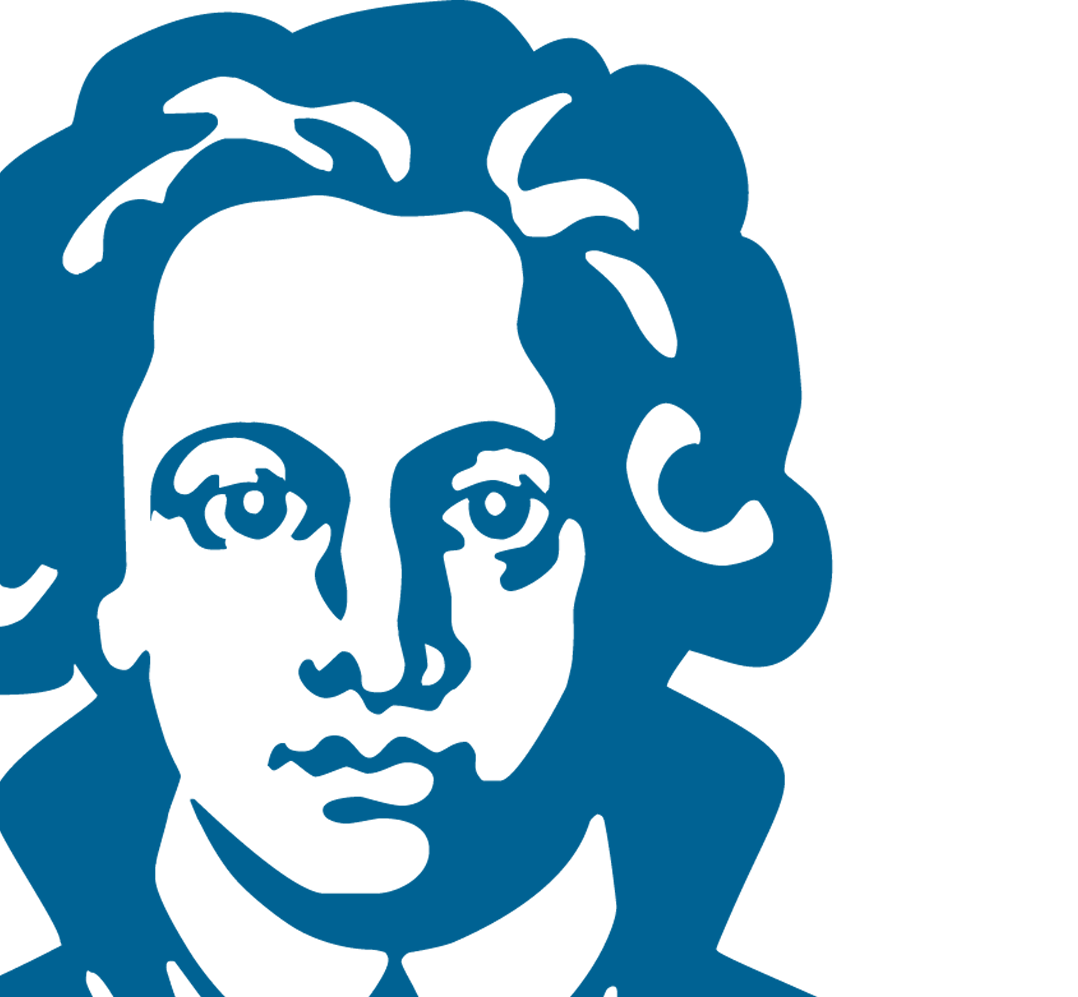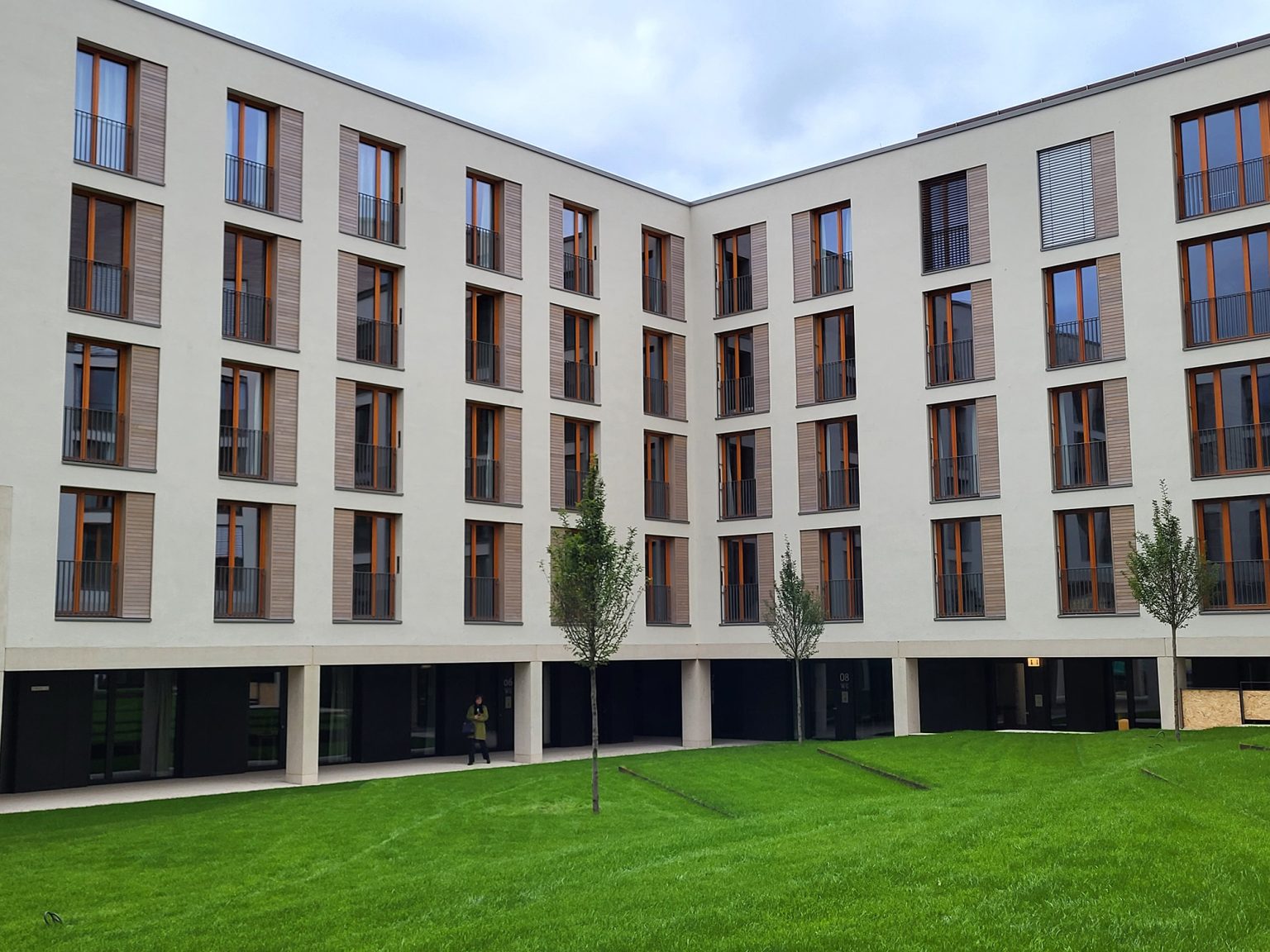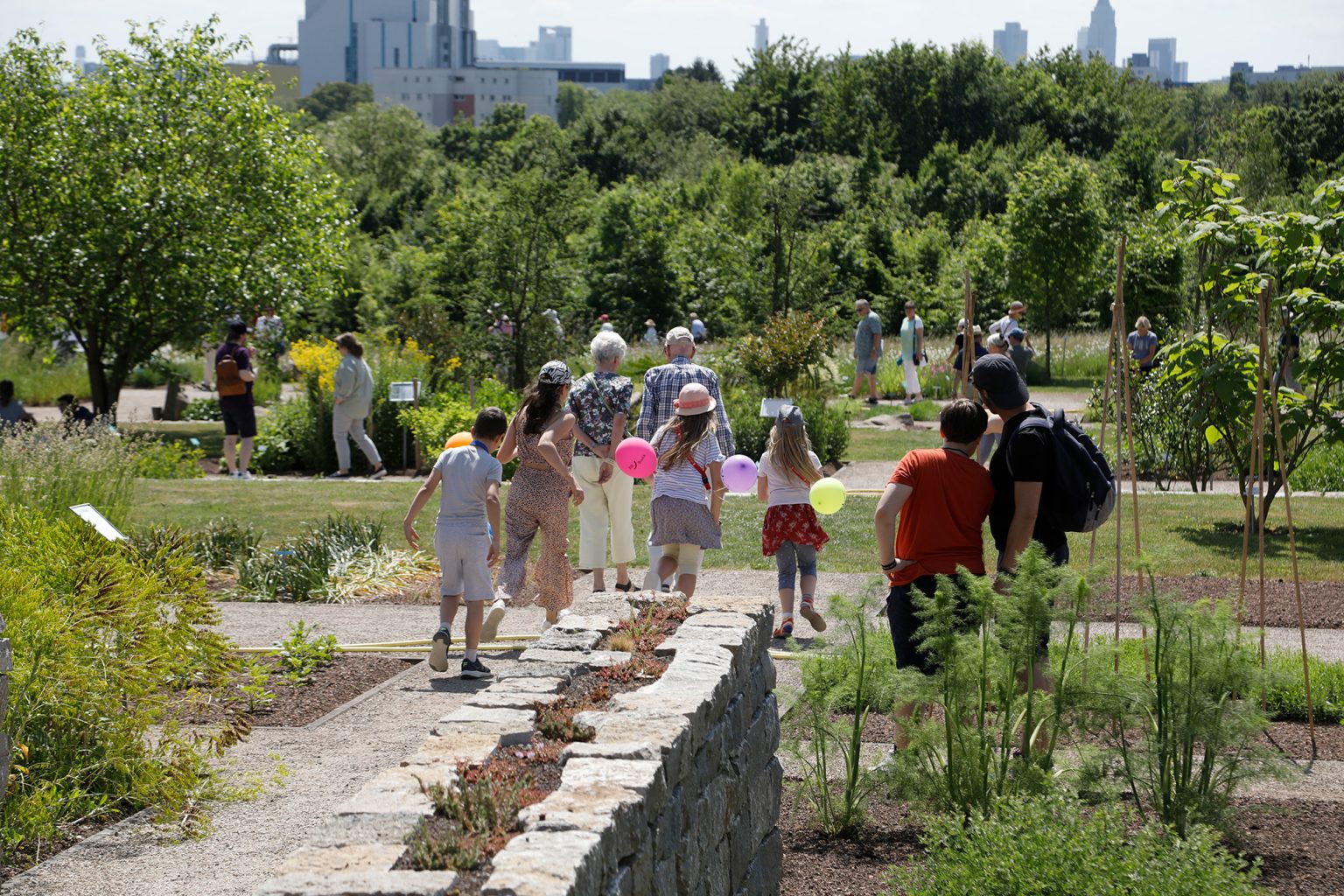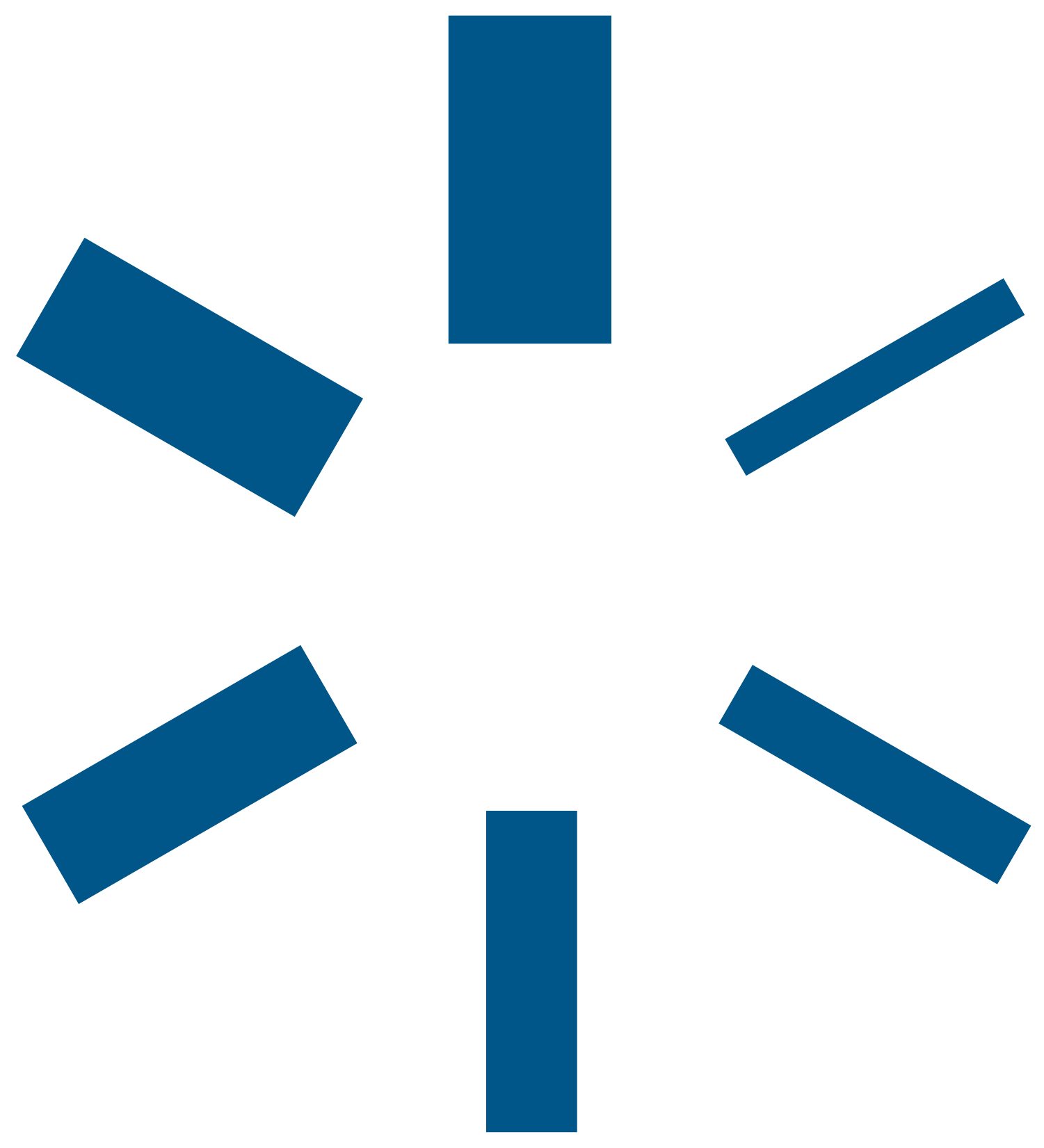
Goethe in progress 2022 – Campus
Viele Orte,
eine Community
Goethe University Frankfurt’s around 43,300 students, roughly 3,700 academics and its 2,100 administrative and technical staff call four campuses in Bockenheim, Niederrad, Riedberg and Westend home. To enable everyone to teach, study, research, communicate, advise and administer in a contemporary and modern manner – irrespective of where they find themselves – requires attractive campuses and a state-of-the-art digital infrastructure, among others.
To that end, Goethe University launched a dedicated digital strategy in 2022. But of course there is nothing to match the backbone of university life: “real life” encounters, including in new buildings such as the one housing the Faculty for Linguistics, Cultures and Arts and its library on Westend Campus, as well as a new student residence and International House, both located on Riedberg Campus. Fostering our unique Goethe spirit across all locations are our spring and summer festivals, which bring together the many people who make up and shape our university to network not only among themselves, but also with Frankfurt citizens.

Tailor-made
What does contemporary teaching, study, research, consulting and administration entail? How is digitalization changing a knowledge archive like the University Library? Goethe University Frankfurt is working on an overarching strategy to address all of this.
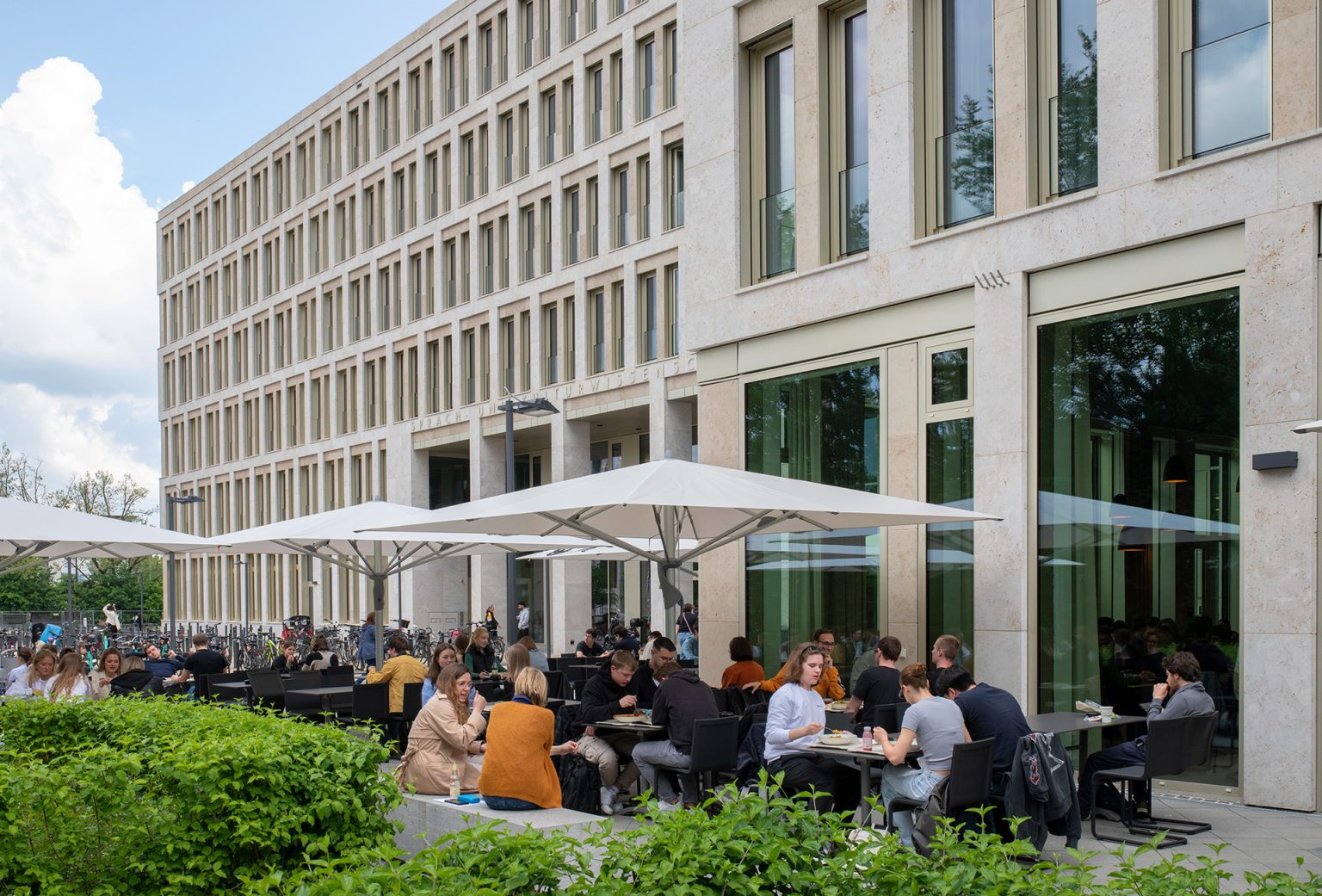
Out with the old, in with the new
The Faculty of Linguistics, Cultures and Arts moved into a new building.
(Photo: ra2studio / Shutterstock)
Tailor-made
Digitalization is changing the lives of each and every one of us, universities included. It takes an overarching digital strategy to meet the challenges it entails. What does contemporary teaching, study, research, consulting and administration require? How is digitalization changing a knowledge archive like the University Library? What role can and should artificial intelligence play?
Goethe University Frankfurt is working on an overarching digital strategy. Chief Information Officer (CIO) Ulrich Schielein, who began this work in May 2022, explains how. Unusual for a German university and a clear sign of Goethe University’s commitment to digitalization: The IT expert is also a full-time Vice President.
Continuous improvement, together: Students collaborate in a hackathon to relaunch the Goethe University App 2.0 (Photo: Jürgen Lecher)
- Digital Strategy
Like building a house: Digitalization needs a target architecture
IT expert Ulrich Schielein has been Chief Information Officer (CIO) and Vice President of Goethe University Frankfurt since May 2022. He explains how he came to be at the university and what cross-university initiatives he and his team at the Chief Information Office have already initiated and developed.
Goethe in progress: Mr. Schielein, you joined the university last year as CIO and vice president, following many years of working as an international consultant. In how far is digitalization in a university context different from that in a company, for example? What, if anything, was initially unfamiliar to you?
Are there milestones in Goethe University’s ongoing digitalization process that you are particularly proud of?
What else have you initiated?
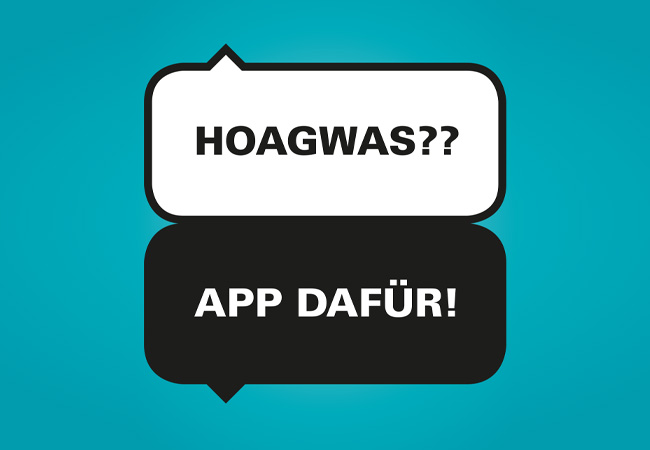
Digitalization is a cross-sectional task. How do you approach this as CIO? How does your team work – also with regard to related actors like the University Computing Center, studiumdigitale or researchers from various faculties?
I am also in touch with different scientists from the Faculty of Computer Science and Mathematics, and have already given a lecture in information systems on the topic of digital architecture management. I feel that the cooperation with the faculties is going very well, and can say I was truly welcomed with open arms. A new initiative we will be launching is the “Center for Critical Computational Studies” (C3S). We are currently in discussions with the founding board and my team and I are working on developing the necessary support structures for C3S and all other faculties.
Do you engage regularly with students or other digital natives?
What does digitalization mean to you personally?
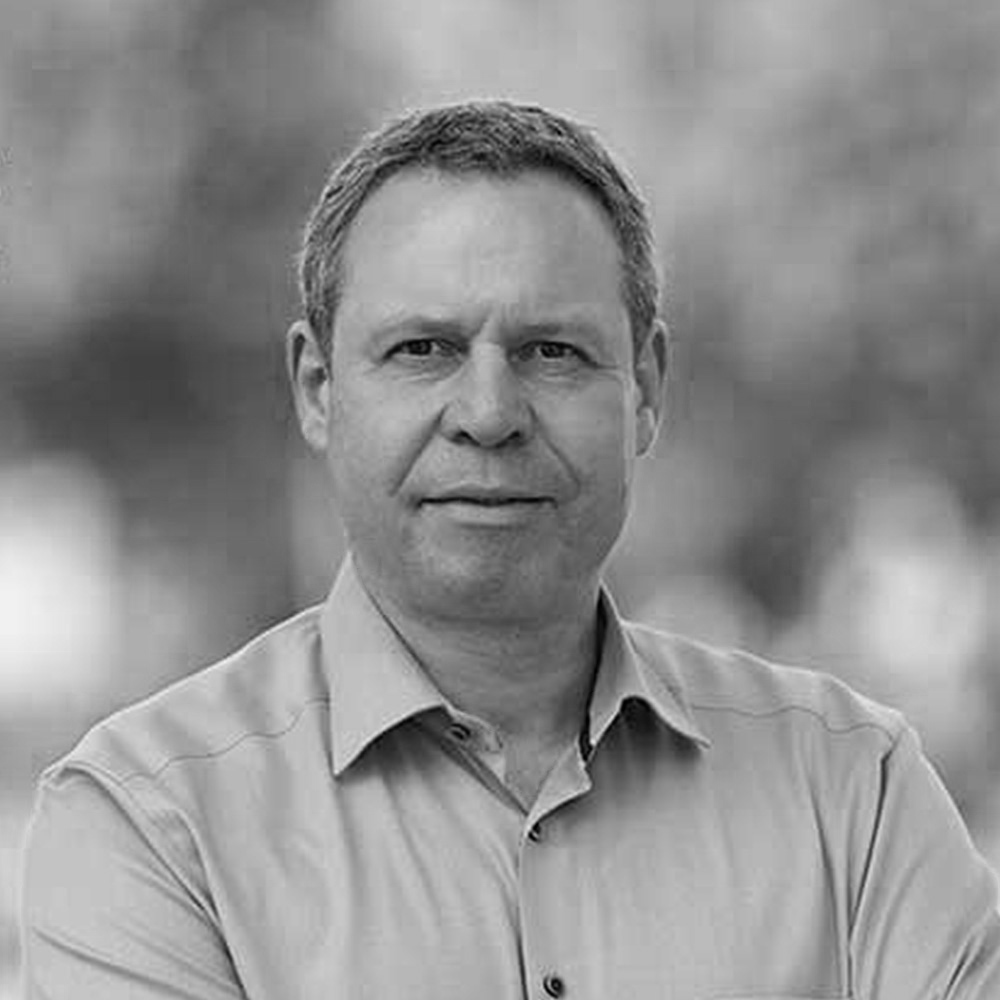
Ulrich Schielein is Chief Information Officer (CIO) and full-time Vice President of Goethe University Frankfurt.
(Photo: Uwe Dettmar)
The new Chief Information Officer and his team
Ulrich Schielein became Goethe University Frankfurt’s first Chief Information Officer (CIO) in May 2022. The 55-year-old graduate in public administration and business informatics has worked in computer-based education and training at Germany’s Federal Employment Agency and spent many years as an internationally active consultant in public and private sector companies working on the efficient and effective use of information technologies. As CIO and full-time vice president of Goethe University Frankfurt, Ulrich Schielein is responsible for the development and implementation of an overarching digital strategy and thus the strategic management of digitalization. Beyond that, he manages the university’s entire IT landscape as well as the further development of its IT infrastructure. He is also responsible for the University Computing Center, the University Library and studiumdigitale. studium digitale.
The Chief Information Officer (CIO) is supported by the Chief Information Office (CI Off), which in future will bundle all central issues relating to Goethe University’s digitalization and information infrastructure. Its tasks include the cross-project management of digitalization and information infrastructure projects (digital transformation) and information architectures (architecture management). Together with the CIO and the Executive Board, the CI Office staff develop strategic guidelines, including the digital strategy, the overall IT concept and the open science strategy.
Do you have a personal motto?
Do you consciously take time to be offline?
Interview: Imke Folkerts
Want to find out more? Read the full-length interview with Ulrich Schielein: Auf dem Weg zu einer digitalen Wissenskultur: Interview mit Ulrich Schielein
(Photo: Black Jack / Shutterstock)
- Digital Strategy
Accompanying the digital transformation
When it comes to the further development of its very own digital strategy in studies and teaching, Goethe University Frankfurt can count on special expertise: Hochschulforum Digitalisierung (HFD) has selected it and seven other universities for a tailor-made strategy consultation in 2022. [Editor’s note: Hochschulforum Digitalisierung is a Germany-wide think tank founded in 2014 that brings together stakeholders from universities, politics, business and society who are involved in the digitalization of teaching and learning. Funded by the Federal Ministry of Education and Research, HFD is a joint initiative of the Stifterverband, the Centre for Higher Education and the German Rectors’ Conference.]
HFD offers “peer-to-peer” strategy consulting for universities, meaning experts work together with the respective university to develop a digital study and teaching concept specifically tailored to the university's profile. It is also within this framework that medium and long-term goals for key strategic action fields are set, good practice examples identified, and measures tailored specifically to the university determined. While this peer-to-peer strategy consultation is aimed at university management, it seeks to involve all internal university stakeholders in the process.
“We are delighted that our application was successful,” says Prof. Christiane Thompson, Goethe University’s Vice President Teaching, Study and Further Academic Education. “To ensure excellent teaching and qualified studies, it is important for digital learning and teaching to be offered wherever such services make sense. It has been greatly beneficial to receive such pinpointed advice on our digital concept.” Also welcoming the digital strategy advice is Ulrich Schielein, who – as Vice President and Chief Information Officer (CIO) – has been responsible for developing and implementing an overarching digital strategy at Goethe University Frankfurt since May. “The fact that we are receiving individual and long-term support in shaping our university’s digital transformation will definitely accelerate the process.”
A total of eight universities were selected in 2022 for the peer-to-peer strategy consultation, which includes an individual deliberation process as well as workshops and conferences, which are held together with other universities and extend beyond the consultation period. In addition, all HFD-funded universities are part of an HFD alumni network, within which they exchange ideas and support each other in the long term.
(pb)
(Photo: Uwe Dettmar)
- Digital Strategy
It is vital that continuous development become part of our routine
How is digitalization changing libraries? In late fall 2021, Johann Christian Senckenberg University Library (UB) asked its employees: Where exactly do we stand, and where do we want to go? In late 2022, UB took its first steps in implementing a new vision, as director Daniela Poth explains.
Goethe in Progress: Ms. Poth, for you at the University Library digitalization is not a new catchword. Nevertheless, the technological developments of the last 40 years have radically changed the relatively old institution that is the library.
Having adopted a mission statement, how do you plan to implement it?
On the one hand, this process sounds never-ending, but there surely must be certain milestones.
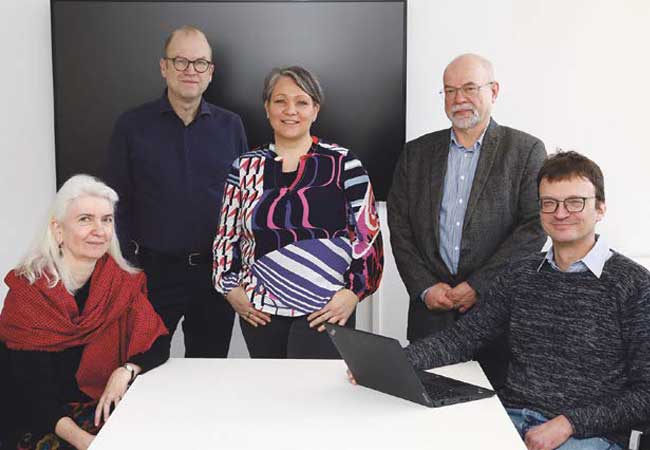
The description of the process contains terms such as SWOT analysis. Should we think of the contemporary university library like a company, which has to constantly analyze itself?
Some say libraries have reached the end of their useful lives. Do you encounter any resistance from policymakers, the university administration, or maybe even from academics?
All the same, the rapid progress in technology also throws up questions about the skillsets required by the staff. Would it be wrong to say that the jobs at the library are becoming increasingly academic?
'Wir sind ein H(UB) für Menschen, Wissen, Services der Goethe- Universität'. Dieser Satz ist Teil unserer Vision im Zielbild
Your staff was closely involved in UB’s strategic process. Do you think the pressure to change is causing them worry or anxiety?
The next question is about UB’s identity and role: In its “Mission 2032”, UB states that its own mission fits into Goethe University Frankfurt’s strategy. Do closer ties with Goethe University constitute a challenge, given that Johann Christian Senckenberg University Library also performs library functions beyond the confines of the university?
Does the development as a place of learning – something affecting students most of all – also feed into the library’s orientation?
Libraries lost their monopoly on information a long time ago
These days there are many players in information society, including publishers for example, who also offer services that could be interesting to some users – against payment of course. Can academic libraries survive in the face of such competition?
The University Library should be a place of interdisciplinary and transdisciplinary exchange, a place that invites collaboration on developing solutions for the complex problems of our time
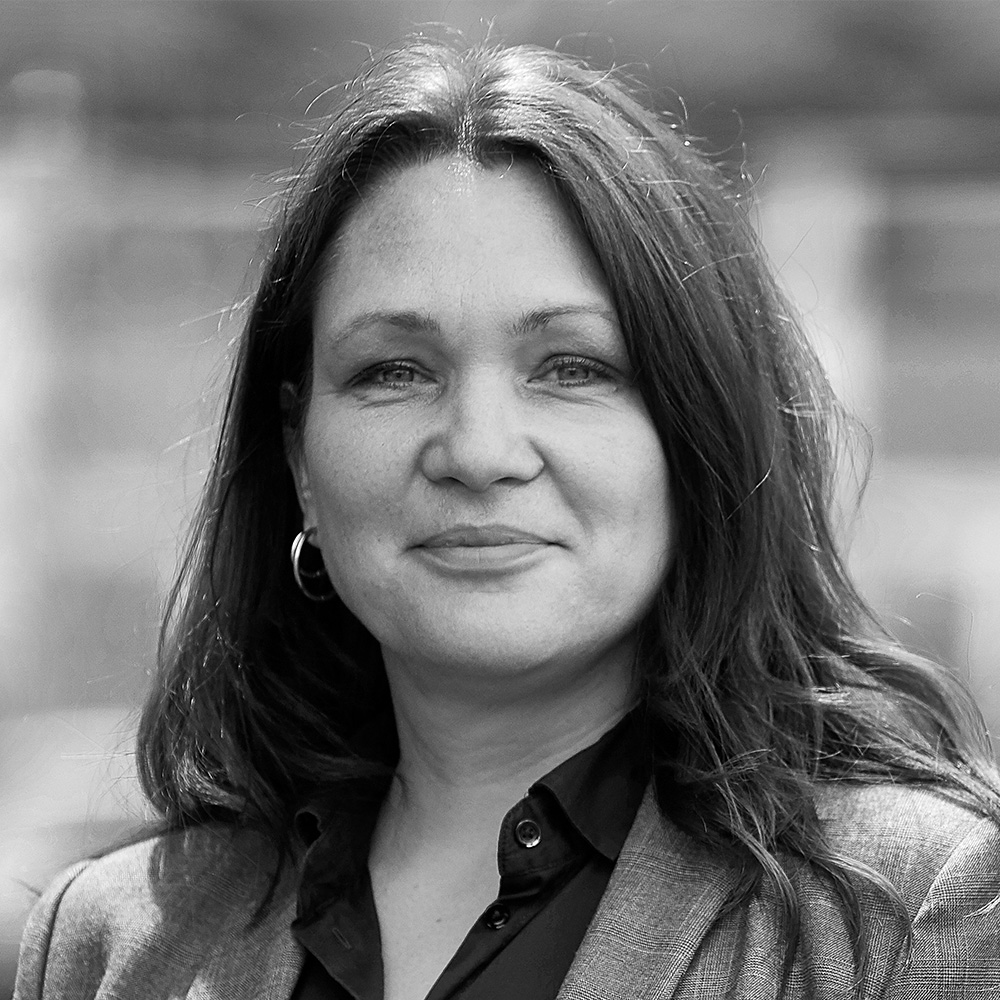
Daniela Poth is the director of Johann Christian Senckenberg University Library
(Photo: Jürgen Lecher)
As of the end of last year, after roughly 20 years of planning, we now have six subject-specific libraries on Goethe University’s campuses. But the last major component is still missing – the main library on Westend Campus. Planning the construction of such a large new building must naturally also take account of the developments in such a volatile field. What could, what should the new UB look like?
Needless to say, the accessibility and surroundings at Westend Campus are different than those at Bockenheim Campus.
Questions: Dirk Frank
The interview appeared in a slightly different form in UniReport 1.23.
»WE ARE A (H)UB SUPPORTING PEOPLE, KNOWLEDGE AND SERVICES AT GOETHE UNIVERSITY.«
The first sentence of the University Library’s strategic mission is an expression of its future aspirations. That is, to become much more of a hub for interdisciplinary interaction and academic support, offering on-site digital and other services that are specifically tailored to the needs of Goethe University researchers, teaching staff and students, while at the same time supporting supra-regional research.
The library began the process of developing its strategy in late fall 2021 through a series of interviews with its employees. A representative cross-section of 41 of the approx. 350 staff members provided assessments of the status quo and of future possibilities, enabling an initial stocktaking. This internal view was subsequently supplemented with four analyses, as part of which a specially created strategy team examined external influencing factors, user perceptions, stakeholders, and the library’s core competencies. Together with top management, the team then carried out a SWOT analysis that produced a profile of strengths (S), weaknesses (W), opportunities (O) and threats (T). On this basis, they then elaborated potential directions for the library’s development, and by the summer of 2022 had created a template for preparing the strategy. Important success factors in this process were repeatedly seeking feedback from library staff and managers, and bringing in external experts, users as well as Goethe University’s Executive Board, which approved UB’s strategic mission on August 2, 2022. The first step towards implementation was the structural reorganization carried out at the beginning of 2023.
You can read the entire mission statement (in German) on the University Library’s website.
Kurz & bündig: Campus-Kunst
The Association of Friends and Sponsors of Goethe University Frankfurt has donated the bronze sculpture “Invincible” by Frankfurt sculptor Wanda Pratschke to the university. The larger-than-life figure of a reclining female body now can be found on the lawn between Westend Campus’ main lecture hall building and the seminar building near Adorno’s workstation in the glass box.
Bronzeskulptur der Bildhauerin Wanda Pratschke auf dem Campus Westend eingeweiht
(Photo: Uwe Dettmar)
Out with the old, in with the new
After four years of construction, the move took place in September: The last remaining humanities institutes and a number of service facilities moved from Bockenheim Campus to the new Linguistics, Cultures and Arts Building on Westend Campus. Feeling a mixture of anticipation and a little melancholy, 510 employees packed up their things – including 14.85 kilometers of books that will now be housed in a joint departmental library.
SKW – this is the abbreviation of the building for linguistics, arts and cultural studies, which seals off Westend Campus’ northeastern border. University President Prof. Enrico Schleiff, Hessian minister of finance Michael Boddenberg, and Ayse Asar, Hesse’s state secretary for the sciences, were present on September 28 when Thomas Platte, director of Landesbetrieb Bau und Immobilien Hessen, handed over the building keys.
The building represents an important milestone in Goethe University's journey from its founding campus to those on Westend and Riedberg. The complex, which has up to six floors, was designed by BLK2 Böge Lindner K2 Architekten and cost just shy of €120 million, including fittings. In terms of its dimensions, the new building is comparable to the Psychology and Educational Sciences Building, which opened in 2013. The SWK building was constructed by the state of Hesse for Goethe University Frankfurt; it exceeds the legally required energy-saving standards and will soon be equipped with a photovoltaic system.
(df)




(Photos: Uwe Dettmar)
(Photo: Uwe Dettmar)
- New hub for Linguistics, Cultural Studies and Arts
Anticipation with a hint of melancholy
“Third expansion stage” – that’s a neutral and matter-of-fact way to put it, but the move was definitely also emotional. Some 510 employees and 3,000 students left Bockenheim and moved into the new premises on Westend Campus. We asked colleagues from the institutes, specialist libraries, GRADE and the Academy for Educational Research and Teacher Training [Akademie für Bildungsforschung und Lehrkräftebildung, ABL] what the mood was like before the move.
I'm looking forward to moving to the new building and am curious to see what effect working here and on Westend Campus will have. Of course, it will take some time to get adjusted to the new reality. A few weeks ago, I joined a tour of the institute's rooms that left me deeply impressed. I’m excited to see how the artistic work will take shape and develop, and am of course also looking forward to everyday work on Westend Campus and the resulting proximity to many colleagues, which makes it that much easier to meet, even by chance!
— Prof. Kerstin Gottschalk, managing director of the Institute for Art Education
(Photo: Uwe Dettmar)
We are very much looking forward to the new Westend premises, the greater proximity to the students and the integration into Goethe University’s central units on Westend Campus. That being said, we are leaving Bockenheim with a heavy heart, and will certainly miss the large meeting rooms in the Juridicum, the weekly market at Bockenheimer Warte and the bustle of Leipziger Straße.
— Dr. Angela Gies, director of the ABL Academy for Educational Research and Teacher Training
There are some things we will definitely miss once we are no longer in Bockenheim: the neighborly atmosphere with the shops and cafés and of course the weekly market. Not to mention the very good subway connection, with Frankfurt main station just two stops away. So, yes, there is a certain sense of sadness at the thought of moving. On the other hand, we will have many advantages in the future. As such, Westend Campus is of course much more beautiful and we are looking forward to our new premises. Beyond that, it will also be good to be closer to the Executive Board and to the colleagues with whom we conduct scientific work.
— Dr. Sybille Küster, director GRADE (Goethe Research Academy for Early Career Researchers)
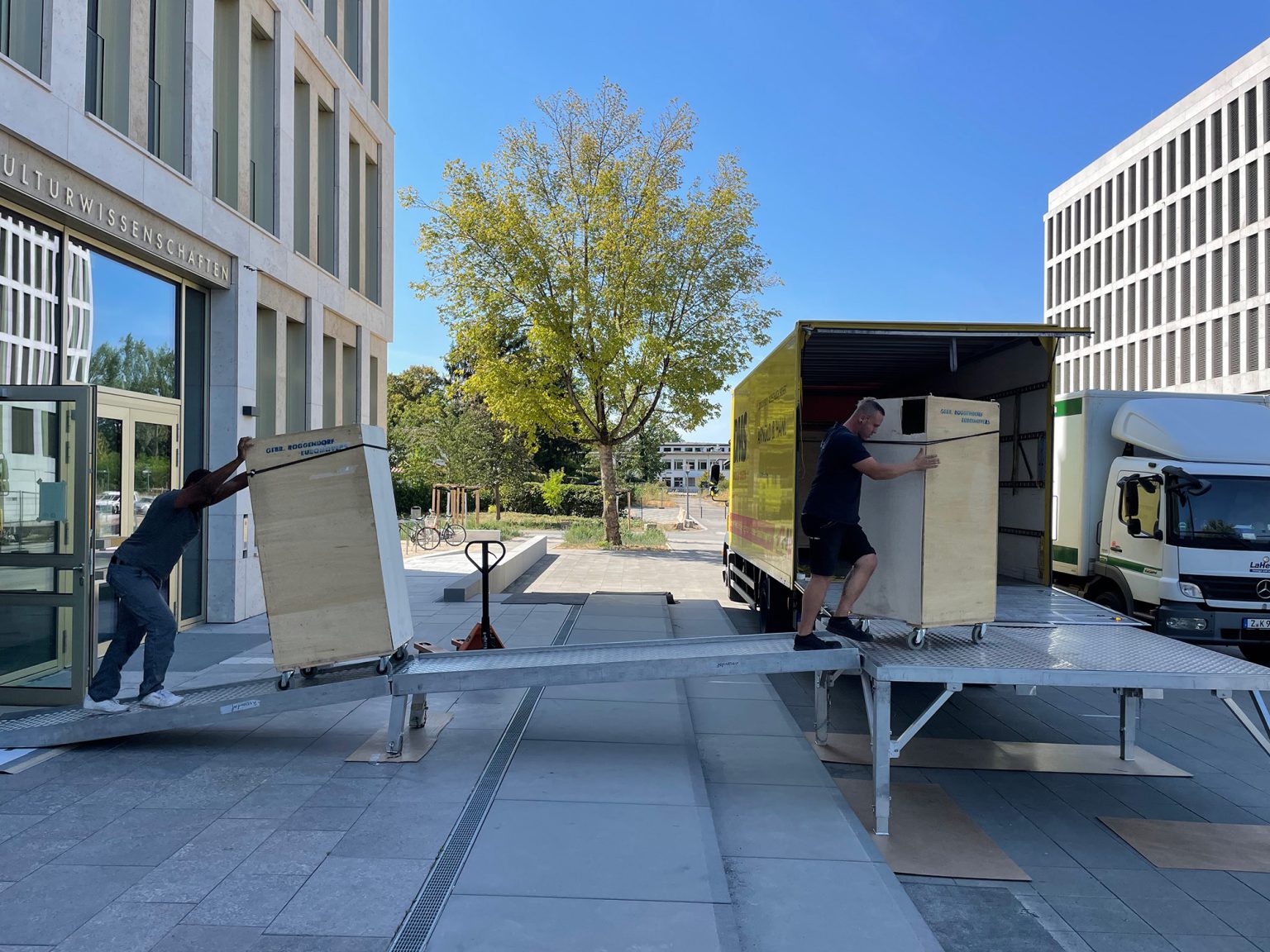
I'm still relatively new here, so I am not really able to compare any before and after situation. Right now, it's quite a lot of work, also since I still have to familiarize myself with my part of the inventory. But all told, I think the move is a positive thing. Users will definitely see an improvement: the opening times will be regulated and access will be easier.
— Veronika Roth, Jewish Studies Library
I'm looking forward to the move – the new departmental library brings many libraries together, giving us a great opportunity to make links and connections clearer. We are currently preoccupied with the specifics of planning the move and determining the order in which the media should move into the new building. We also still need to clarify how the lending desk will work in the future and what basic knowledge those working at the information desk will need. As all colleagues will be providing lending and information services, we are training each other, giving short ten-minute presentations on the individual collections’ most important facts and special features.
— Charlotte Jakob, Sinology Library
Until now, everything in our music and theater collection was a bit like during days gone by: our media were still recorded in card catalogues, for example. To ensure that the books can be borrowed from the new departmental library, they are now all catalogued electronically and secured with barcodes. While these changes are of course necessary for the move, they also mean that some things will no longer be so easy in future: At the moment many teachers simply let me know when they are taking a book to their course and then return it later. In future, with the books now coded, everything will have to be ordered in advance.
— Anne Wibrow, Music and Theater Library
Editor: Imke Folkerts, GoetheSpektrum
(Photo: Uwe Dettmar)
- New hub for Linguistics, Cultural Studies and Arts
A library all to itself
The relocation of Linguistics and Cultural Studies to Westend Campus is also a big step for Johann Christian Senckenberg University Library: twelve departmental libraries, previously spread across Bockenheim Campus, are now under one roof.
The plan to combine all of the university's departmental libraries into six departmental libraries alongside the central library was forged 20 years ago. Now, the twelve departmental libraries for linguistics and cultural studies have been consolidated into one departmental library.
What challenges came with the move and what makes the new library so special? Until the appointment of the new library director, Africanist Dr. Aïsha Othman, in September 2022, Christiane Schaper was the acting director responsible for setting up the new Linguistics and Cultural Studies Library. Schaper also acts as director of the Humanities Library: “The goal was clear from the outset: to round out the humanities field by merging the departmental libraries; that is, to bring together all the humanities subjects that previously had not been housed in a divisional library into the available space, and to operate them as a joint library through Johann Christian Senckenberg University Library. This relocation goes hand in hand with greater accessibility and usability, for example through extended opening hours and a contemporary range of services for all usages, including group study rooms, a modern loan booking system, and registration in the University Library common catalog. Implementation required a lot of preparatory work – both in terms of the data that had to be recorded for the catalog, as well as organizationally. It was a challenge managing both at the same time: Preparing for a move – which took up a lot of our time in recent months – and simultaneously getting ready for library operations.”
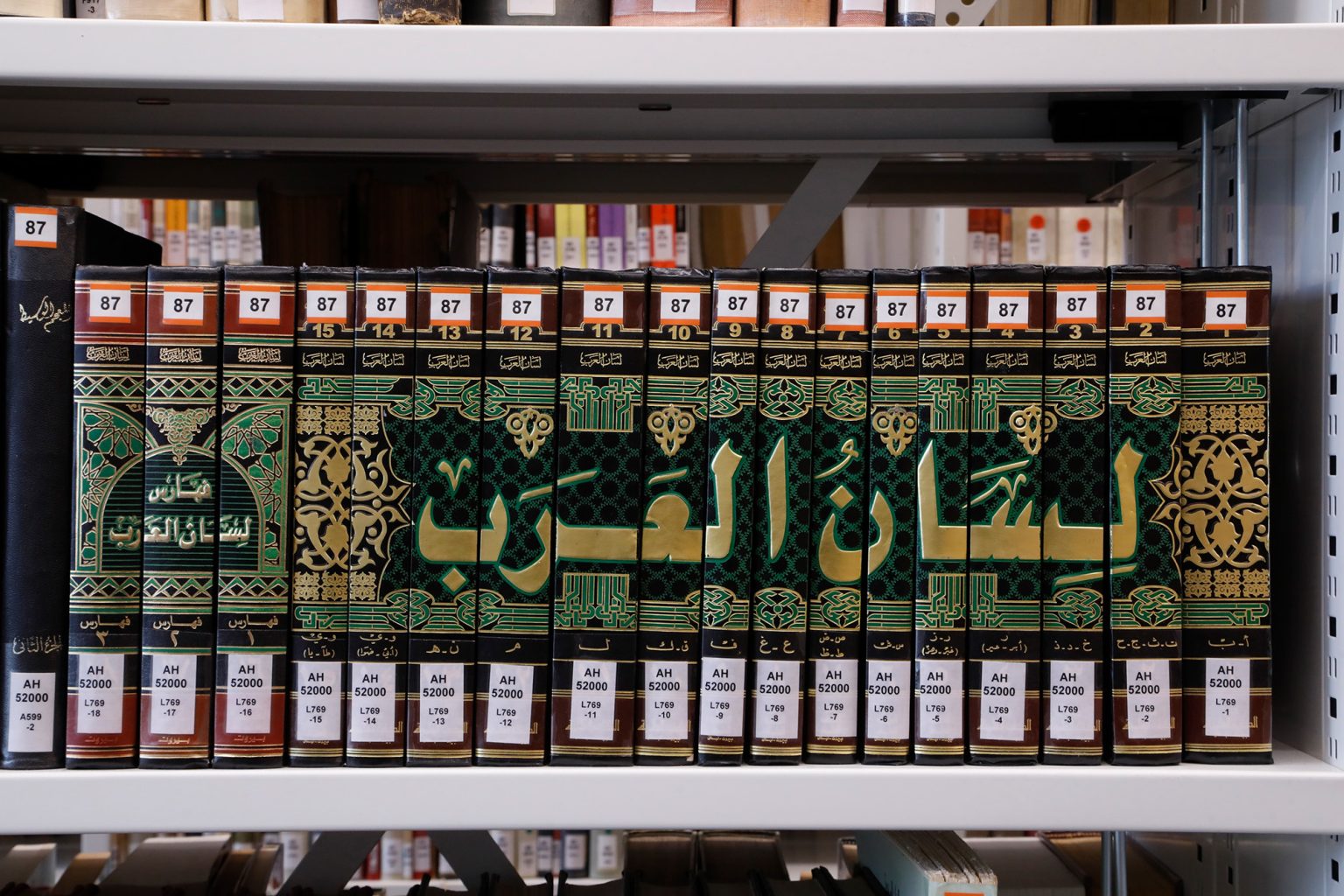
Outlining the new library’s concept, Dr. Angela Hausinger, deputy director of Johann Christian Senckenberg University Library, explains: “The departmental library concept is not new; it is used in all departmental libraries, and based on a lot of open-access holdings, few materials in storage, no additional room to grow. In essence, what we are talking about is a self-renewing library. This means when something comes in here, something else has to go or be handed over to the central library, which also has an archiving function. If you look around the BSKW, you can see that there are no meters of empty shelves. On the contrary, we’re already filled to the brim.”
In September 2022, African studies specialist Dr. Aïsha Othman took over the management of the new Linguistics and Cultural Studies Library. Othmann will remain the main contact person for African Studies at the University Library, which she has headed since 2017. What excites her most about her new role? “First and foremost, I am delighted to be close to the researchers, teachers and students of linguistics and cultural studies. The multilingualism and multiculturalism of the holdings often poses a challenge, but it’s what makes this library so appealing to me. Last but not least, the task of bringing the sub-libraries and the team together into a single unit is both interesting and varied.”
Editor: Imke Folkerts, GoetheSpektrum
(Photo: Uwe Dettmar)
The Linguistics and Cultural Studies Library: Facts and Figures
Departmental libraries
The Linguistics and Cultural Studies Library comprises 12 departmental libraries of the Faculty of Linguistics, Cultures, and Arts:
- African Studies • Empirical Linguistics • Islamic Studies • Japanese Studies • Jewish Studies • Korea Studies • Art Library/Städel Library • Art Education • Musicology • Phonetics • Sinology • Southeast Asian Studies
Workplaces for users
350 work places • 257 individual reading places • 6 reservable common work rooms
Inventory and Move
Room for 385,000 books, about 100,000 of them in storage • Equivalent to 14 consecutive kilometers of shelves, 10.8 km of which are open-access, and 3.2 km in storage • Moving period: August 22 to September 22, 2022 • all told, 14.85 km of inventory (incl. donations to the central library) were moved
Staff
Equivalent of 17 full-time library staff (most working part-time) • Supported by student assistants
Management
Dr. Aïsha Othman
Wooden panels on a concrete base: the student residence and International House houses a dance, yoga and music room as well as a sewing room, bicycle workshop and cinema. (Photo: Stefanie Wetzel)
Innovative living quarters
Thermally insulated, sustainable and featuring a range of themed activities: The new student residence and International House on Riedberg Campus opened just in time for the start of the winter semester.
“Have a room available? Then rent it out to a student!” Studierendenwerk regularly asks citizens of the Rhine-Main region for living space. In September, the student support association itself was able to offer young people almost 400 apartments: 359 apartments for students, six of them barrier-free, and 27 apartments for visiting academics in the International House – all located on Riedberg Campus. The rent for students is up to €350, while a two-room apartment costs up to €420. Visiting researchers pay from €550 onwards for either one of 16 single apartments, nine double apartments, as well as two family apartments.
Hesse's largest timber residential building was erected in three and a half years: energy-efficient, compact, highly insulated and sustainable. In a timber hybrid construction, all floor slabs and walls were built entirely in a cross-laminated timber (CLT) panel construction above a concrete base. The building is also equipped with a photovoltaic system that meets the entire house’s needs. About 100,000 kWh of electricity can be generated each year, of which 90-95 percent goes into captive use. All excess electricity is fed into the public grid.
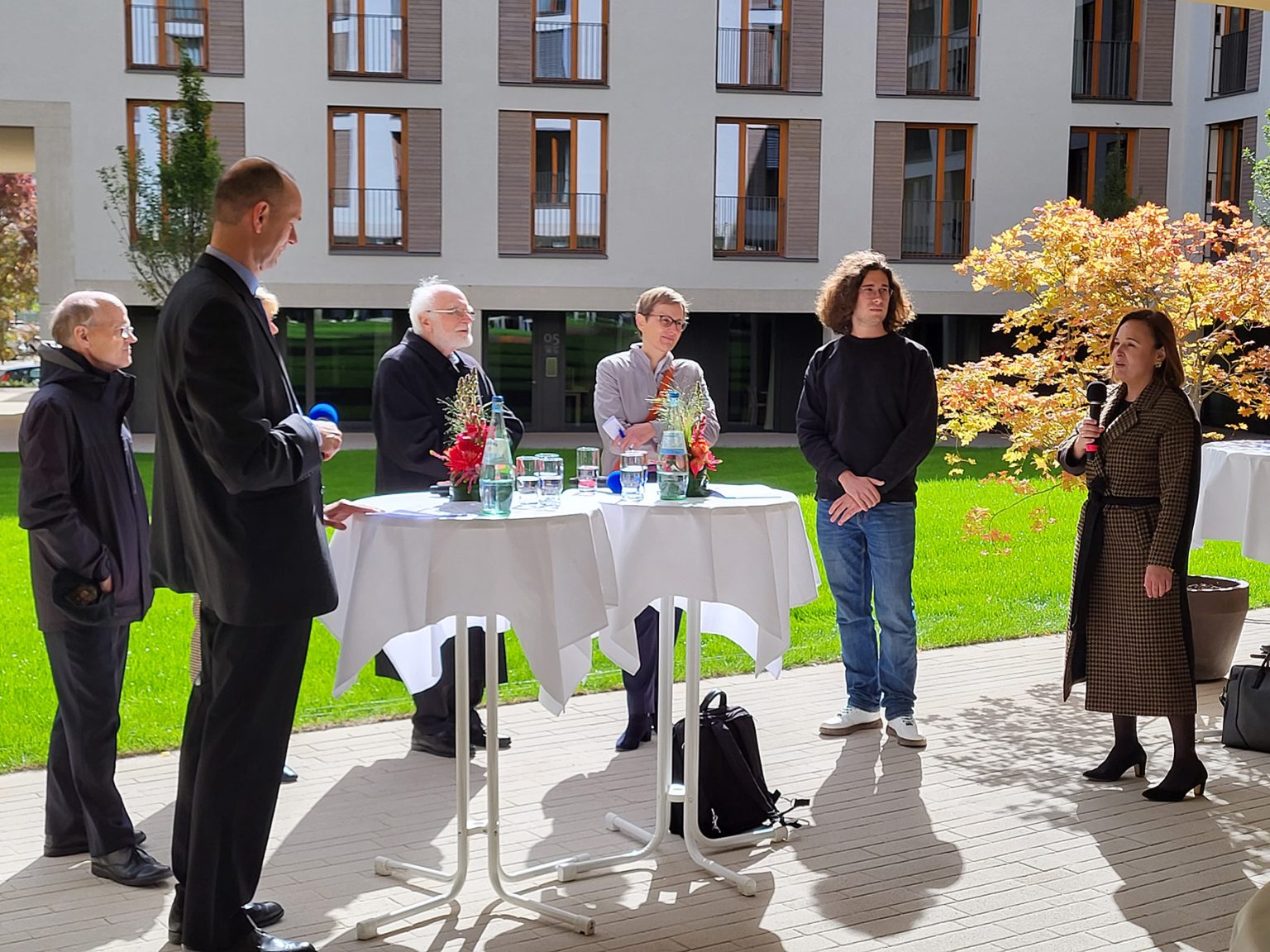
Beyond its sustainable construction, another distinguishing characteristic of the new accommodation for students and visiting scientists is the themed rooms and participatory activities, supervised by relevant instructors. A laundromat complete with a lounge area, a dance and yoga room, a music room, a fitness room, a sewing room, a home cinema room, two study rooms, a bicycle workshop, and a sunlit garden-courtyard all foster communal living.
The new building is a common project of Studierendenwerk Frankfurt and the Foundation for the Promotion of Goethe University Frankfurt’s International Academic Relations, who together form the building venture “Bauherrengemeinschaft IHCR”, which owns the living complex. The building was designed by Frankfurt architects Ferdinand Heide, who also drew up the master plan for Westend Campus and provided the designs for the canteen extension, lecture hall and seminar building.
(pb)
(Photo: Uwe Dettmar)
Campus festivals
Visitors of the sixth Goethe University Spring Festival on Riedberg Campus were welcomed with bright sunshine: some 1,500 guests flocked to the festival held on the university’s natural sciences campus on May 22, which was opened by University President Prof. Enrico Schleiff.
Following his welcoming words, the science garden’s scientific director Prof. Meike Piepenbring, and its technical director Robert Anton introduced their premises. Amid perfect spring weather, many guests went on a discovery tour through the garden’s open-air area. All told, the science garden covers around three hectares and is home to more than 100 medicinal plants as well as plants used for teaching purposes. Particularly curious visitors could join guided tours on topics such as the “Evolutionary Ecology of Plants” and the “Oak Forest of the Future”. Those who simply wanted to relax and soak up the sun could do so with a cool drink in one of the many deckchairs. Live music was also on hand: Carlos Vivas & Dana Barak kicked the festivities off with clarinet and guitar, followed later in the day by jazz from the band “Markierungen & Winkel”.
(if/pb)




(Photos: Uwe Dettmar)
- Campus festivals
Summer – Campus – Party
Following a pandemic-related break of nearly three years, the summer party celebrations returned to Westend Campus.
“We couldn't have chosen a better day” – these were the words with which University President Prof. Enrico Schleiff opened the summer festival on July 18, 2022. The first campus festival since the outbreak of the coronavirus pandemic took place in bright sunshine and temperatures above 30 °C. Under the motto “Summer – Campus – Party”, students, staff and members of the public had the opportunity to experience Goethe University Frankfurt beyond its daily routine.
Before inviting everyone to celebrate, the university president thanked the Goethe community for its commitment and dedication over the past three years. Then the rich program began, offering plenty of variety for the visitors well into the evening hours.
One corner of Westend Campus was transformed into southern France: next to the AStA building, the boules area invited visitors to join in and watch. A few meters down, second-hand items changed hands at the “Drehscheibe” flea market.
The children's program at Goethe University's Museum Giersch was all about “absolute color”: children aged between four and twelve created colorful worlds using experimental elements of thread painting. Anyone wanting to try their hand at using textile paint and markers on fabric bags could do so and take their own summer accessory home with them.
...then it was time for Frankfurt band Urban Socks, who got the party started with their indie pop sound featuring jazz, soul and rock elements.
By 10 p.m. at the latest, Westend Campus became really packed, as Shantel and ATA DJ took to the stage for their performances. Shantel, himself a former student at Goethe University Frankfurt, last performed a concert on campus for the university's 100th birthday in 2014. Of course, his hit “Disko Partizani” also played at this year's summer party. The beats of the two DJs resounded across Westend Campus and beyond until late into the night.
Photos: Benjamin André and Uwe Dettmar
Text: (ih)
